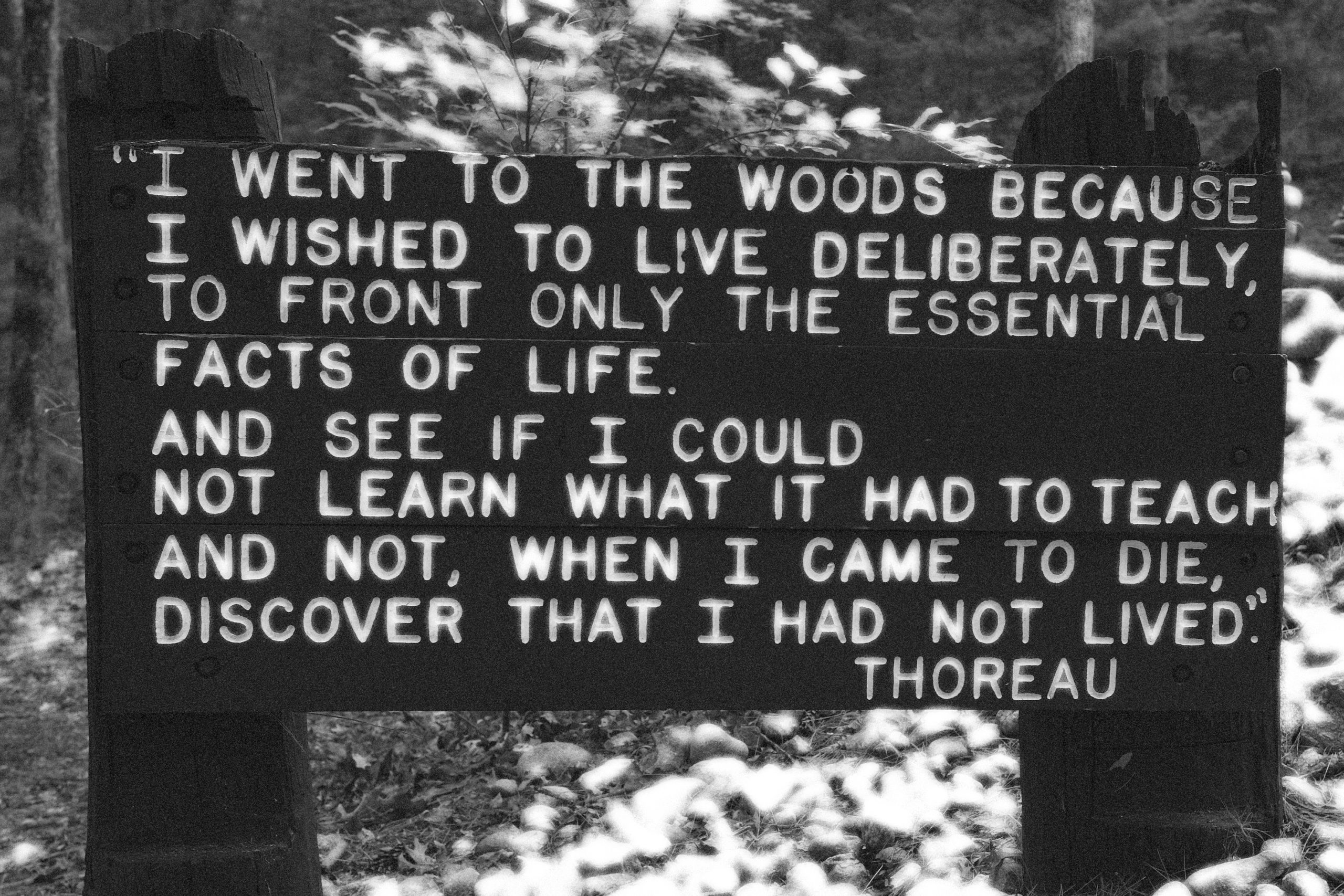
Have you ever dreamed of escaping to a cabin in the woods and surviving there with only the bare necessities?
Henry David Thoreau, one of the most famous American writers in history, did just that. In 1845, at the age of 28, Thoreau moved into the woods near Walden Pond, in Massachusetts. He lived in a small wooden cabin that he built himself – a simple building about 3m by 4.5m in size, with a fireplace and a small window. Thoreau brought very little with him to his cabin. He had shelter, food, clothes, some good books to read and some paper to write on.
Paying attention
The two years and two months that he lived there inspired the book for which he would eventually become famous: Walden; or Life in the Woods. When you first hear about it, Walden seems like it might not be very exciting. It records the experiences and thoughts of a guy living by himself in a forest. What’s more, Thoreau’s life isn’t what we’d normally think of as exciting. In fact, he tried hard to make his life in the woods uncomplicated: “Simplicity, simplicity, simplicity!” he declared.
But Walden is far from boring. The reason why Thoreau tried to make his life simple is precisely so he could pay attention to the things we normally ignore or don’t notice. Thoreau writes fascinatingly about the many things he sees, hears, tastes, touches and smells in the woods. When the things that hold his attention in the city go away, he finds that there is a whole world to be experienced and observed, from plants to animals to the changing seasons. Most importantly, though, Thoreau finds he can observe and experience himself. He writes with deep insight about the thoughts and feelings he has, and about the many lessons he learns, while living in this unusual way.
The way Thoreau writes can sometimes make Walden tough to understand. This isn’t because he is writing in an especially strange style, but because he lived quite a while ago, and the way people use language changes over time. But the points Thoreau makes are timeless, and it is worth sticking at it and trying to understand him.
Self-reliance
Have you ever felt lonely, even though there were lots of people around? If so, you know that being lonely and being alone aren’t really the same thing. If we can be lonely in a crowd, then maybe some of our best experiences can come from being by ourselves. Even so, many people find it hard to be alone. Many of us struggle to be good company for ourselves, to be ‘self-reliant’. But if you think about it, it would be worth figuring this out, since the person you’re going to spend the most time within your life is, well, you!
Thoreau thought that the most important part of learning to be self-reliant was to understand how your own thoughts, how the way you look at the world and speak to yourself, can affect your life. “What a man thinks of himself,” writes Thoreau, “that it is which determines…his fate.” “I know of no more encouraging fact than the unquestionable ability of man to elevate his life by a conscious endeavor,” he wrote. “It is something to be able to paint a particular picture, or to carve a statue, and so to make a few objects beautiful; but it is far more glorious to carve and paint the very atmosphere and medium through which we look, which…we can do. To affect the quality of the day, that is the highest of arts.” What Thoreau is telling us here is that the most powerful thing we can do in our lives is not learn this skill or that piece of knowledge, but instead learn how to change our minds, our own point of view.
He is not saying, though, that our goal in improving ourselves should be to become or think like someone else. Instead, Thoreau wants us to try to become the truest version of ourselves. He also believed that this was possible to do throughout our lives – that no matter what happens, we have the ability to start over, to try again, to do better.
Living deliberately
Thoreau moved to the woods to escape from the commitments and demands of normal life, to escape from the pressure of other people’s opinions and expectations, and to have more time for “leisure”.
This might make it sound like the guy was a bit lazy. But Thoreau didn’t think escaping from society meant having no responsibility or not having to do anything. In fact, Thoreau wanted to gain a deeper understanding of what really mattered in life. He thought that most people made themselves very busy, usually just copying what others do, without stopping to think about whether what they were doing made sense. “No way of thinking or doing, however ancient, can be trusted without proof,” he writes. “What everybody echoes or in silence passes by as true today may turn out to be falsehood tomorrow, mere smoke of opinion, which some had trusted for a cloud that would sprinkle fertilizing rain on their fields.”
Thoreau didn’t want to live his life following the crowd, but to see what was important to him. “I went to the woods because I wished to live deliberately,” wrote Thoreau, in probably his most famous statement, “to front only the essential facts of life, and see if I could not learn what it had to teach, and not, when I came to die, discover that I had not lived.” Thoreau thought that the most important thing in life was for each unique person to find out what he or she thinks. We can’t learn this from parents, friends, teachers, celebrities or religious leaders. These people can help us, and they might give us important guidance, but at the end of the day, nothing can replace thinking about and developing our own preferences, tastes, beliefs and values , and coming up with our own goals. If we live only according to the ideas of others, Thoreau suggests, we might waste our lives. “I learned this, at least, by my experiment,” he wrote, “that if one advances confidently in the direction of his dreams, and endeavours to live the life which he has imagined, he will meet with a success unexpected in common hours.”
Beyond the woods
Of course, Thoreau didn’t just want to be separated from others or alone with his thoughts. He believed that going into the woods would bring him new peace and special insights. To feel connected to nature, living among the trees and the animals, and to feel at one with the land he was standing on, made Thoreau feel more in touch with himself. He believed that modern people, living in cities or towns, had lost their connection with the natural world to which they belonged, and they couldn’t be physically or mentally healthy without this contact. It’s worth thinking about this next time you choose to scroll social media or get sucked into a YouTube vortex. It’s scientifically proven that the great outdoors are beneficial for the ‘great indoors’ – that is, for our mental and emotional wellbeing.
But you also don’t need to move to a cabin in the woods to “live deliberately”, as Thoreau urges us to do. You just need to find some peace and quiet, away from the eyes and influence of others. You could simply take some time away from your smartphone or computer, away from friends and siblings. Hopefully you can find a spot outside and ask yourself: What do I believe? What do I care about? What makes me happy? You can also go borrow Walden from your local library – and decide what you think of it for yourself.
Words: Jason Childs




















